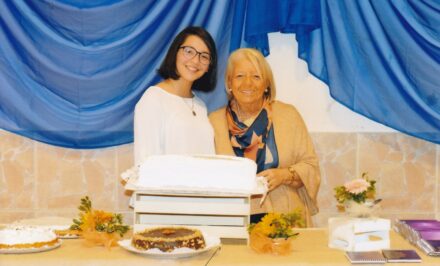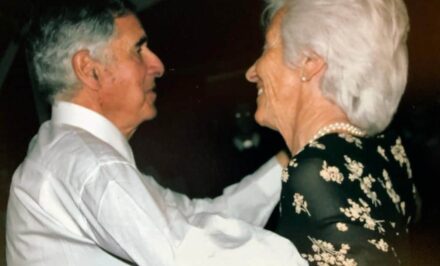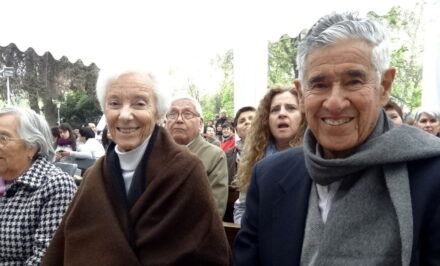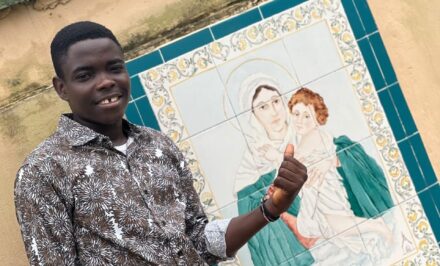 GERMANY, mda. “Almighty God, also bless my enemies”. Suddenly the people at the postal counter who had been queuing impatiently, were drawn into a conversation about injury and reconciliation, enmity at work and at home, and the strength it requires even to think about someone who has done us an injustice or harmed us, without talking negatively about them or even worse. “Please give me ten more”, the young woman said who had started the conversation. “I have never seen such a stamp before”. Behind her someone remarked, “I think I will put one on my desk.” “Almighty God, also bless my enemies.” The special stamp to mark the hundredth birthday of the priest, Karl Leisner, was released this week. It moves people with its simplicity and the power of the quotation from the last diary entry (on 25 July 1945) of this young man from the Lower Rhine who died of TB shortly after the liberation of the concentration camp at Dachau. “Almighty God, also bless my enemies”. His hundredth birthday will be celebrated on 28 February 2015.
GERMANY, mda. “Almighty God, also bless my enemies”. Suddenly the people at the postal counter who had been queuing impatiently, were drawn into a conversation about injury and reconciliation, enmity at work and at home, and the strength it requires even to think about someone who has done us an injustice or harmed us, without talking negatively about them or even worse. “Please give me ten more”, the young woman said who had started the conversation. “I have never seen such a stamp before”. Behind her someone remarked, “I think I will put one on my desk.” “Almighty God, also bless my enemies.” The special stamp to mark the hundredth birthday of the priest, Karl Leisner, was released this week. It moves people with its simplicity and the power of the quotation from the last diary entry (on 25 July 1945) of this young man from the Lower Rhine who died of TB shortly after the liberation of the concentration camp at Dachau. “Almighty God, also bless my enemies”. His hundredth birthday will be celebrated on 28 February 2015.
![]()

The graphic artists, Prof. Daniela Hauf, and Prof Detlef Fiedler, of Berlin designed the special stamp that costs 62 cents. It has been on sale in the Post Office since 5 February 2015 and will be officially introduced on 9 February at 12 md in the hall of the Major Seminary in Munster. An album of first day cover stamps will be given to Bishop Felix Genn, Monika Kaiser-Hass, Vice-President of the International Karl Leisner Circle (IKLK), and Fr Benedikt Elshoff, President of the IKLK, who took the initiative of applying for a special stamp.
The hundredth birthday of Karl Leisner, who was beatified on 23 June 1996 in the Berlin Olympic Stadium by Pope John Paul II, is important not only for the people in the post office at Lohmar. The Xanten Stiftmuseum will host an exhibition on Karl Leisner until the end of June. A mobile exhibition with about 13 Roll Ups will visit various German cities and towns.
A conference on Karl Leisner will take place in Spring in the Franz Hitze Haus in Munster. It has been organized by the IKLK, as have the stamps, the Xanten exhibition, and the memorial statue in Kleve, which was put up already at the end of last year for the seventieth anniversary of Karl Leisner’s ordination in the concentration camp at Dachau.
A Schoenstatter of the second Schoenstatt century …
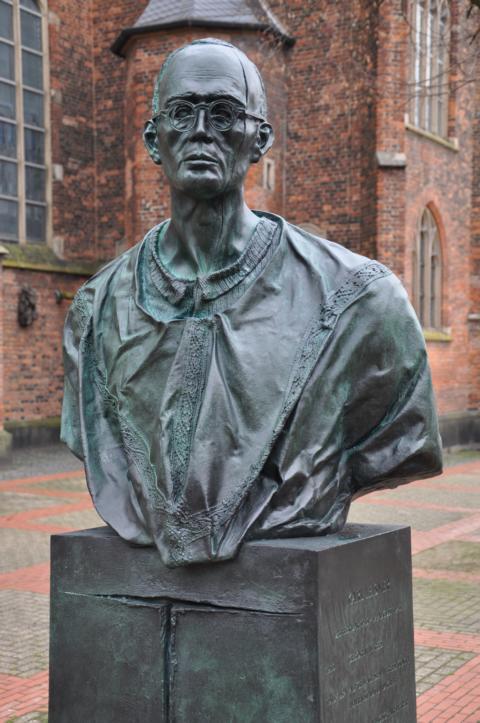 A Wurzburg newspaper wrote about the “Jesuit Karl Leisner” in connection with the special stamp and Karl Leisner’s hundredth birthday. Actually only his friend and biographer, Fr Otto Pies SJ, is a Jesuit. Karl Leisner was a Schoenstatter through and through, but not exclusively, and he wasn’t known in the concentration camp as a “representative of Schoenstatt”. No one was. He was simply a Schoenstatter: whose identity was based on the covenant of love and who exercised a very varied apostolate wherever and however his personal calling took him. He made use of his many gifts where and when the doors and people opened to him, in order to win people for God. Schoenstatt took quite some time to discover its first Blessed, a martyr, who was not in the first place concerned with building up Schoenstatt, but who went out from the shrine to the outskirts of society. At the extreme periphery – the concentration camp at Dachau – he was already dying when he was ordained a priest there, and only celebrated Holy Mass once.
A Wurzburg newspaper wrote about the “Jesuit Karl Leisner” in connection with the special stamp and Karl Leisner’s hundredth birthday. Actually only his friend and biographer, Fr Otto Pies SJ, is a Jesuit. Karl Leisner was a Schoenstatter through and through, but not exclusively, and he wasn’t known in the concentration camp as a “representative of Schoenstatt”. No one was. He was simply a Schoenstatter: whose identity was based on the covenant of love and who exercised a very varied apostolate wherever and however his personal calling took him. He made use of his many gifts where and when the doors and people opened to him, in order to win people for God. Schoenstatt took quite some time to discover its first Blessed, a martyr, who was not in the first place concerned with building up Schoenstatt, but who went out from the shrine to the outskirts of society. At the extreme periphery – the concentration camp at Dachau – he was already dying when he was ordained a priest there, and only celebrated Holy Mass once.
The theological place of Movements is the street, Cardinal Jorge Mario Bergoglio said in 1999 during a meeting of Movements in Buenos Aires. “How much damage is done by those who only contemplate their own navel and don’t go out to be missionaries! They don’t go out to pass on what they have inherited, what they received without charge, out of the pure grace of Christ, from the pure love of a Father in communion with the Holy Spirit. Careful! Careful with elites! Elites enclose themselves in soap bubbles, lose their missionary vision, lose their impetus, lose their courage. Institutions and Movements have to pass on what they have inherited. You ask me, “Father, where?” On the street, on the street! There, where the life of our city is decided. There, where the eternal redemption of men and women is decided. There, where values are at stake. There, where so many children can begin from their earliest years to go the wrong way that will make them unhappy for the rest of their lives. The street is the theological place of the Movements and Institutes. That is where they must sacrifice themselves, give what they have been given, pass on what they have inherited, that they received without charge. … As your Bishop I beg you: Don’t guard your heritage in the glass cases of your book exhibitions. Carry it onto the streets, look for your missionary vision, commit yourselves completely every day so that this inheritance, which you received without charge, can become the ferment of this city” (29 May 1999).
A message and request that fits to Karl Leisner. With all the risks entailed and which he confronted, borne by the missionary strength of his consecration to the Mother Thrice Admirable of Schoenstatt, his beloved MTA.
“A church that doesn’t go out is a church of ‘snobs’. An ecclesial Movement that does not go out on its mission is a Movement of ‘snobs’. Even worse, instead of going out to look for the sheep to bring them home, or to help or bear witness, they devote themselves to little groups and comb the sheep. Isn’t that true? They are spiritual hairdressers! It’s impossible!” Jorge Mario Bergoglio, Pope Francis, spoke those words fifteen years later during the Jubilee audience for the Schoenstatt Movement. “That is to say, go out, go out of our selves. A closed Church or Movement, a closed community, will fall ill! They have all the illnesses of thick-wittedness and stubbornness. A Movement, a church, a community that goes out can make mistakes. But it is so nice to ask for forgiveness if we have made a mistake, so don’t be afraid of it!”
Karl Leisner, one of the many Schoenstatters who went out, who lived the “covenant of love inside”. In the language of the Pope he was fatally injured in going out. In going out in this way you can’t go far, because Jesus is there who went out to the utter limits. He met Karl Leisner in the deepest sense of those words. Almighty God, bless also my enemies.
Schoenstatt celebrates the hundredth birthday of Karl Leisner
 According to the information of Fr Stefan Keller of the Schoenstatt Institute of Diocesan Priests, various events will take place in Schoenstatt in the time around the hundredth birthday of Karl Leisner. On Wednesday, 5 March, a solemn Holy Mass with Emeritus Archbishop Robert Zollitsch will take place at 7.30 p.m. in the Adoration Church to commemorate the hundredth birthday of Karl Leisner.
According to the information of Fr Stefan Keller of the Schoenstatt Institute of Diocesan Priests, various events will take place in Schoenstatt in the time around the hundredth birthday of Karl Leisner. On Wednesday, 5 March, a solemn Holy Mass with Emeritus Archbishop Robert Zollitsch will take place at 7.30 p.m. in the Adoration Church to commemorate the hundredth birthday of Karl Leisner.
The Schoenstatt Institute of Diocesan Priests will organise a so-called Moriah Week from 2-8 August this year on the subject of Karl Leisner. Fr Hans-Karl Seeger (editor of the diaries) and Fr J. Schmiedl have been invited to speak.
The days of Adoration in the Marienau during Carnival will use texts by Karl Leisner. Fr Ernst Gerkens of Kleve, the Custos of the Karl Leisner birthplace, Flandrischen Strasse 11, Kleve, and Theo Hoffacker (Xanten-Marienbaum) have accepted responsibility for the content of this time.
I haven’t written any more long letters
At a time when emails, Skype, Whatsapp, Twitter and Facebook can be found everywhere, letter writing has gone out of fashion.
I needed and bought twenty special stamps of Karl Leisner for the photo. And now? I can’t put these simple and provocative stamps in a glass display case. Or in a desk drawer as a memento. Not according to the words of Jorge Mario Bergoglio. Not according to the witness of Karl Leisner. Almighty God, also bless my enemies. They have to go out. And I already know a few …



